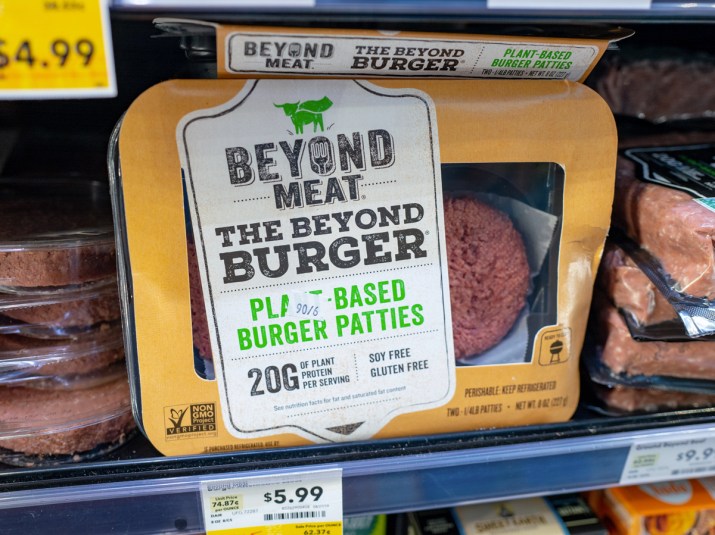Is Fake Meat Actually Healthier Than the Real Deal?

With the recent rise in popularity for plant-based diets, fake meat companies like Beyond Meat and Impossible Foods have been popping up in grocery stores and fast food chains all over the country. But are they actually any healthier than the real deal?
Well, it’s not an easy question to answer. We reached out to celebrity nutritionist Gabriela Peacock who tells FIRST, “There is not enough human research done on the impact of ‘fake meat’ products to clarify any long-term effects.” She also brought up the ongoing dispute about whether red meat is really less healthy than white meat or plant-based alternatives. “The effects of red meat will vary depending on the source of the meat, the animals’ diet, any additional treatments it has consumed, and how it has been processed.”
Although she believes in consuming more minimally processed and locally sourced natural food items, she also understands that those can be difficult to access for many communities. “The introduction of ‘fake meats’ may create a way for individuals to reduce their consumption of low-quality meat products and improve poor quality diets,” she says. She also says that those types of plant-based burgers can be easy way for non-meat eaters to get plenty of protein and iron in their diet.
With all of that in mind, let’s take a closer look at the nutritional values between Beyond Meat Burger, Impossible Burger, and a regular ground beef burger. We consulted both companies’ official websites, plus the United States Department of Agriculture’s (USDA) catalogue of food information. For reference, both the Beyond and Impossible versions come as 113 gram patties. The USDA’s 85 percent lean meat burger measurement is slightly less at 100 grams, but that’s still pretty close.
When looking at the amount of calories, protein, and fat, all three options are generally in the same ballpark. If you have a soy allergy or sensitivity, you should avoid the Impossible Burger, as that is its main source of protein. Likewise, anyone following a ketogenic diet will need to take into consideration that these plant-based “meats” contain about three carbs each, but also contain a few grams of fiber.
The real contrasts come in when you look at their levels of cholesterol and sodium. Both Impossible and Beyond burgers are completely free of any cholesterol, but pack a hefty punch with 370 milligrams and 390 milligrams of sodium respectively. Regular ground beef, on the other hand, has 84 milligrams of cholesterol and 79 milligrams of sodium. Keep in mind, the American Heart Association recommends no more than 1,500 milligrams of sodium for adults per day, so one of the fake meat patties won’t put you over the edge entirely, but will make a dent. The US Food and Drug Administration also recommends less than 300 milligrams of daily cholesterol in a normal diet, but if you’ve been warned by your doctor to cut back even more on that, you might want to try one of the fake meat products instead.
Whether or not the plant-based products are a better option will ultimately depend on each of our own personal health needs, but they aren’t an excuse to indulge on burgers any more often than you would with traditional patties. Whichever way you go, moderation is key.
More From FIRST
These Carbs Actually Help With Weight Loss, According to a Nutritionist
These Sweet Treats Prevent Bone and Hair Loss and Can Help You Lose Weight
This Superfood Oil Will Lower Cholesterol, Ease Anxiety, and Fight Menopause Symptoms













